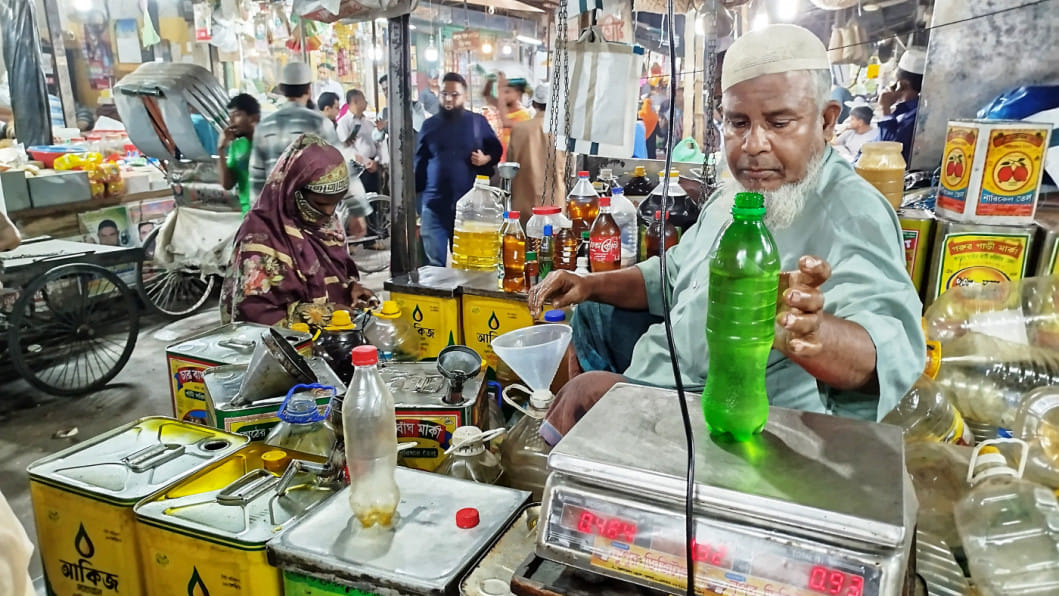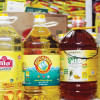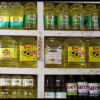Edible oil crisis is artificial: tariff commission

The Bangladesh Trade and Tariff Commission (BTTC) met with refiners yesterday and concluded that the country does not have any shortage of edible oil at present.
Instead, local markets have a surplus of the cooking ingredient and the commission stated that the ongoing edible oil crisis is artificial.
Yesterday, the BTTC discussed the overall edible oil supply situation with the country's leading refiners as local kitchen markets face a shortage of both branded bottled and non-branded loose soybean oil, prompting a price spike.
At the meeting, top refiners said there is no supply crisis in the market; rather, they have increased soybean oil supply by 25 percent year-on-year in January this year.
Moreover, customs data shows that edible oil imports surged by nearly 35 percent between December 2024 and January 2025, with letters of credit increasing at a similar rate.
Additionally, multiple sources confirmed that global edible oil prices have remained steady and that imports are ensuring stable supply and pricing in the local market, according to the BTTC document released yesterday.
In yesterday's meeting, Amitabh Chakraborty, adviser to City Group—one of the country's top food grain importers, which markets Teer-branded oil—said the company supplied around 50,700 tonnes of oil in January 2025, of which 22,242 tonnes were bottled.
In contrast, the group supplied 14,262 tonnes in bottled form during the same month in 2024.
The Meghna Group of Industries supplied 15,000 tonnes of bottled oil in January this year, compared to 12,000 tonnes in the same month last year, said Taslim Shahriar, senior assistant general manager of the group.
Meghna Group, a leading commodity importer and processor that markets Fresh-branded oil, supplied around 47,668 tonnes of edible oil last month, compared to only 25,000 tonnes in the same month last year, he said.
TK Group, another leading importer and commodity processor that markets Pusti-branded oil, also reported a 24 percent year-on-year increase in bottled soybean oil supply in January 2025, said Md Shafiul Ather Taslim, director for finance and operations at the group.
The amount reached around 11,810 tonnes this year, up from 9,500 tonnes in the same month last year.
The refiners commented that stockpiling by some individuals at the grassroots level might be responsible for the perceived crisis in the market.
Many might have resorted to cutting open bottles and selling the oil in bulk to maximise profits, they said.
The meeting took place at a time when retailers and wholesalers in major cities, including Dhaka, Chattogram, and Barishal, reported to The Daily Star that the oil supply had declined after the government rejected refiners' requests to raise prices in January.
According to data from the Trading Corporation of Bangladesh, the price of bottled soybean oil per litre is now Tk 175 to Tk 176, marking a 1 percent increase over the past month.
Over the past week, the price of loose soybean oil per litre rose nearly 4 percent, reaching Tk 180 to Tk 182 yesterday.
Retail prices of two-litre bottles of soybean oil, as well as palm oil and rice bran oil, have also risen.
For instance, the price of a one-litre bottle of rice bran oil increased by 6.41 percent to Tk 205 to Tk 210 yesterday.
Moinul Khan, chairman of the BTTC, who chaired yesterday's meeting, told The Daily Star that the refiners assured they would not increase soybean oil prices in the coming days ahead of Ramadan.
"Imports have increased in the country, and supply in the market has also risen. There is no shortage of any kind," he said.
Additionally, around 150,000 tonnes of oil are in the pipeline and will arrive in the country before Ramadan, he added.
To reduce pressure on soybean and palm oils, the government has cut duties on the import of sunflower and canola oils.

 For all latest news, follow The Daily Star's Google News channel.
For all latest news, follow The Daily Star's Google News channel. 








Comments